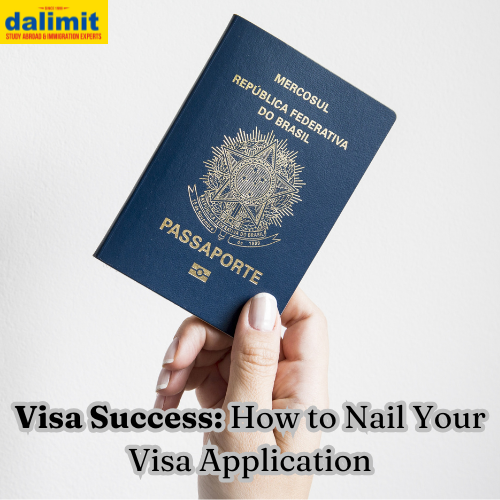Whether you’re planning to study abroad, travel for leisure, or work in another country, securing the right visa can be a critical first step in your journey. A successful visa application opens the door to exciting opportunities, but the process can often feel overwhelming. However, with the right preparation and mindset, you can increase your chances of securing that coveted visa approval.
In this blog, we’ll guide you through the essential steps to achieve Visa Success.
1. Understand the Visa Requirements Thoroughly
Each country has different visa types and unique requirements. Before you even start filling out forms, it’s crucial to research and understand the specific requirements for your visa type. Are you applying for a student visa, work visa, tourist visa, or something else? Each has different documentation, financial requirements, and timelines.
2. Prepare Your Documentation Carefully
One of the leading causes of visa rejection is incomplete or incorrect documentation. Ensure that you gather all required documents and double-check that they meet the criteria outlined by the embassy or consulate. Common documents include:
- Valid passport (with at least six months of validity)
- Completed visa application form
- Proof of financial stability (e.g., bank statements, sponsorship letter)
- Travel itinerary (for tourist visas)
- Admission letter (for student visas)
- Employment letter (for work visas)
Don’t rush through this step. Organize your documents systematically, and always make sure they’re clear, legible, and up-to-date.
3. Apply Early to Avoid Time Pressure
Visa processing times can vary from a few weeks to a few months, depending on the country and visa type. Waiting until the last minute to apply can add unnecessary stress and increase the chances of missing important deadlines.
Pro Tip: Aim to submit your application at least 3–4 weeks before your planned travel or study date, giving enough time for any additional documentation requests or delays.
4. Prepare for the Visa Interview
For many types of visas, particularly work and student visas, an interview is required. This can be one of the most critical parts of your application, as the consular officer will ask questions about your travel plans, financial situation, and ties to your home country.
How to Prepare:
- Be clear and confident when answering questions.
- Provide honest, concise, and accurate information.
- Show that you have a genuine intention to visit and will return to your home country when the visa expires.
- Be prepared to explain how you’ll financially support yourself during your stay.
5. Show Strong Ties to Your Home Country
Embassies want to know that you won’t overstay your visa. One of the key factors they look at is your ties to your home country. These can include a stable job, family, property, or education.
How to Show Strong Ties:
- Submit proof of employment (such as a letter from your employer or recent pay stubs).
- Show evidence of property ownership or lease agreements.
- Provide documentation of family commitments (e.g., birth certificates, family letters).
6. Be Honest and Transparent
Honesty is the best policy when applying for a visa. Providing false or misleading information, whether intentionally or accidentally, can lead to rejection or even a permanent ban on entering certain countries. Always provide truthful answers, and never try to hide important details. If you’re unsure about something, it’s better to clarify than to risk providing inaccurate information.
7. Keep Track of Your Application Status
Once you’ve submitted your application, many embassies and consulates allow you to track your visa status online. Stay updated on any additional information requests, and if you’re missing something, provide it as soon as possible. This can help prevent delays and ensure your application stays on track.
Pro Tip: If you don’t hear back within the expected time frame, don’t hesitate to follow up with the embassy to inquire about the status of your application.
8. What to Do if Your Visa is Denied
Visa rejection is disappointing, but it’s not the end of the road. If your visa is denied, you’ll typically receive a reason for the refusal. Use this as constructive feedback to improve your next application. In some cases, you may be able to appeal the decision, or you can reapply after addressing the issue that led to the denial.
Key to Remember: A visa rejection doesn’t necessarily mean you’ll be denied again in the future. Many applicants successfully reapply by strengthening their case and providing additional supporting evidence.
Advantages:
- Access to New Opportunities: Work, study, or travel abroad for personal and professional growth.
- Cultural Exposure: Experience diverse cultures, languages, and global perspectives.
- Career Advancement: Enhance your career with international experience or top-tier education.
- Path to Residency: Some visas lead to permanent residency or citizenship.
- Global Networking: Build valuable connections that can benefit your career and personal life.
Conclusion: Achieving Visa Success
The visa application process can be lengthy and sometimes stressful, but with the right preparation and attention to detail, you can greatly improve your chances of success. Start by understanding the specific requirements for your visa type, gather all necessary documentation, and give yourself plenty of time to submit the application.
Remember, honesty and clarity are key, and showing your strong ties to your home country will go a long way in convincing the embassy that you are a responsible and legitimate applicant.
Good luck with your visa journey! We hope you find success and are one step closer to making your travel dreams a reality.

